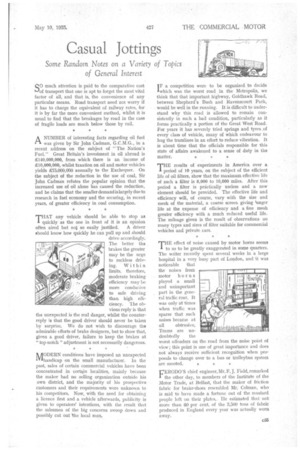Casual Jottings
Page 93

If you've noticed an error in this article please click here to report it so we can fix it.
Some Random Notes on a Variety of Topics of General Interest
So much attention is paid to the comparative cost of transport that one is apt to forget the most vital factor of all, and that is, the convenience of any particular means. Road transport need not worry if it has to charge the equivalent of railway rates, for it is by far the more convenient method, whilst it is usual to find that the breakages by road in the case of fragile loads are much below those by rail.
A NUMBER of interesting facts regarding oil fuel r-1was given by Sir John Cadman, G.C.M.G., in a recent address on the subject of " The Nation's Fuel." Great Britain's investment in oil abroad is £140,000,000, from which there is an income of £.10,000,000, whilst taxation on oil and motor vehicles yields £75,000,000 annually to the Exchequer. On the subject of the reduction in the use of coal, Sir John Cadman refutes the popular opinion that the increased use of oil alone has caused the reduction, and he claims that the smaller demandislargely due to research in fuel economy and the securing, in recent years, of greater efficiency in coal consumption.
AT any vehicle should be able to stop as quickly as the one in front of it is an opinion often aired but not so easily justified. A driver should know how quickly he can pull up and should drive accordingly. The better the brakes the greater may be the urge to reckless driving. Within limits, therefore, moderate braking efficiency may be more conducive to safe driving than high efficiency. The obvious reply is that the unexpected is the real danger, whilst the counterreply is that the good driver should never be taken by surprise. We do not wish to discourage the admirable efforts of brake designers, but to show that, given a good driver, failure to keep the brakes at "top-notch "adjustment is not necessarily dangerous.
MODERN conditions have imposed an unexpected handicap on the small manufacturer. In the past, sales of certain commercial .vehicles have been concentrated in certain localities, mainly because the maker had no selling organization outside his own district, and the majority of his prospective customers and their requirements were unknown to his competitors. New, with the need for obtaining a licence first and .a vehicle afterwards, publicity is given to operators' intentions, with the result that the salesmen of the big concerns swoop down and possibly cut Out the local man. IF a competition were to be organized to decide which was the worst road in the Metropolis, we think that that important highway, Goldhawk Road, between Shepherd's Bush and Ravenscourt Park, would be well in the running. It is difficult to understand why this road is allowed to remain consistently in such a bad condition, particularly as it forms practically a portion of the Great West Road. For years it has severely tried springs and tyres of every class of vehicle, many of which endeavour to hug the tramlines in an effort to reduce vibration. It is about time that the officials responsible for this state of affairs awakened to a sense of duty in the matter.
THE results of experiments in America over a period of 10 years, on the subject of the efficient life of oil filters, show that the maximum effective life of such a filter is 8,000 to 10,000 miles. After this period a filter is practically useless and a new element should be provided. The effective life and efficiency will, of course, vary with the size and mesh of the material, a coarse screen giving longer life at the expense of efficiency and a fine mesh greater efficiency with a much reduced useful life. The mileage given is the result of observations on many types and sizes of filter suitable for commercial vehicles and private cars.
HETeffect of noise caused by motor horns seems to us to be greatly exaggerated in some quarters. The writer recently spent several weeks in a large hospital in a very busy part of London, and it was noticeable that the noises from motor horns played a small and unimportant part in the general traffic roar. It was only at times when traffic was sparse that such noises became at
all obtrusive. Trams are undoubtedly the worst offenders on the road from the noise point of view'; this point is one of great importance and does not always receive sufficient recognition when proposals to change over to a bus or trolleybus system are mooted.
laft111113 nrikettlegt
FERODO'S chief engineer, Mr. F. J. Field, remarked the other day, to members of the institute of the Motor Trade, at Belfast, that the maker of friction fabric for brake-shoes resembled Mr. Colman, who is said to have made a fortune out of the mustard people left on their plates.. He estimated that not more than GO per cent, of the 3,500 tons of fabric produced in England every year was actually worn away.




































































































































































